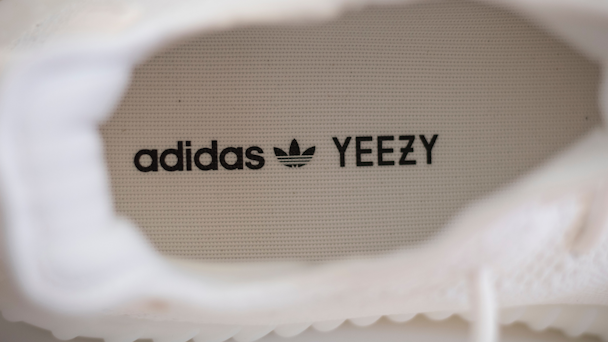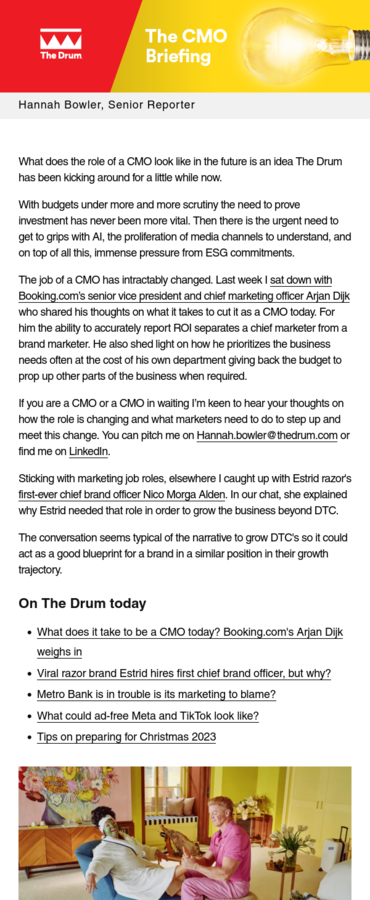‘Can’t put a genie back in a bottle’: brand experts on Adidas’s lawsuit over Ye contract
Adidas is facing a new class-action lawsuit for allegedly failing to mitigate the financial risks of its partnership with Ye – despite internal concerns since at least 2018.

Adidas denies allegations that it failed to effectively mitigate the risks of its partnership with the controversial rapper / Kyle Brinker
Adidas investors are suing the German sportswear giant over its now-severed partnership with rapper-designer Ye, formerly known as Kanye West.
In a class-action suit filed in federal court in Oregon on Friday, plaintiffs allege that the company was well aware of the artist’s “extreme behavior” and antisemitic views but did nothing to warn investors or effectively mitigate financial risk to the company before it cut ties with Ye in the fall of 2022.
Shareholders say that Adidas “routinely ignored” the rapper’s behavioral issues and concerning public comments – including those about slavery and race – for years. The complaint, which cites a November 2022 Wall Street Journal report about the company’s relationship with Ye, alleges that Adidas executives considered cutting ties with Ye over reputational risks as early as 2018.
Adidas, however, denies the allegations. “We outright reject these unfounded claims and will take all necessary measures to vigorously defend ourselves against them,” the company said in a statement to The Drum.
Advertisement
The controversy
Adidas dropped Ye – and his uber-popular Yeezy line – after a string of highly controversial events last year that began with a Yeezy fashion show featuring ‘White Lives Matter’ tee-shirts and came crashing down with a series of antisemitic tweets and an appearance on Alex Jones’ talk show InfoWars in which the rapper publicly praised Adolf Hitler.
The decision came in October – a month before Adidas launched its own internal investigation into workplace conduct after former employees penned a letter to the brand, saying that prior allegations of Ye’s poor behavior on the job had been met with an insufficient response. Ex-employees alleged that Ye showed employees inappropriate sexual content and engaged in bullying at Adidas.
In the wake of the controversy, Adidas said in February that its decision not to carry Yeezy products will result in an anticipated $1.3bn in sales losses this year. The company also said operating profits were expected to be negatively impacted to the tune of $534m. “The numbers speak for themselves. We are currently not performing the way we should,” Adidas’ chief exec Bjørn Gulden said in a statement at the time. “2023 will be a year of transition to set the base to again be a growing and profitable company.”
Now, with investors seeking damages from Adidas, the brand stands to suffer even more.
Advertisement
Customer loyalty on the line
For Adidas, although much of the damage is already done, brand reputation and consumer loyalty may take another hit, according to branding and PR experts.
“This is one of those branding situations where you can’t immediately put the genie back in the bottle, as it were,” says Robert Passikoff, founder of market research firm Brand Keys.
Brand Keys conducts detailed research on customer loyalty, measured in part by consumer sales. According to the organization’s latest data, Adidas has dropped from its number two slot to number four in customer loyalty since last fall. “And from a loyalty perspective,” Passikoff says, the decline doesn’t show signs of slowing. He anticipates that the brand will continue to lose consumers’ love.
Even so, Passikoff doesn’t find Adidas’ alleged negligence particularly shocking. “The fact that Adidas ignored serious issues regarding partnering with Ye, putting shareholders at risk, shouldn’t come as a surprise to anyone,” he says. “It’s textbook 21st-century branding á la sponsorship. Companies don’t pay a lot of attention to a celebrity’s personal behavior until they can’t ignore it anymore.”
But other experts suggest that while such short-sightedness may be common among big brands, negligence is not excusable. “Major corporations like Adidas make calculated decisions about exposure every day, and with something as important as civil liberties and hate speech, it's ill-advised for a company to play fast and loose with their risk management,” says Kara Schmiemann, director at Red Banyan, a firm specializing in crisis communications for brands. “Having your own shareholders target you in litigation due to poor strategic choices is not a good look – and one that can stick with the company for some time.”
Suggested newsletters for you
The issue of transparency
The Wall Street Journal report cited in the plaintiffs’ complaint details a 2018 presentation to company executives – including then-chief exec Kasper Rørsted and Adidas’ head of HR – that spelled out potential risks for employees interacting with Ye and proposed a handful of mitigation tactics, including the possibility of dropping the partnership altogether.
Despite the fact that Ye had already made concerning public comments – including saying in early 2018 that slavery “sounds like a choice” – Adidas did not explicitly denounce the behavior (though Rørsted said in a Bloomberg interview that the rapper had made “some comments we don’t support”). The lawsuit also claims that “Rørsted … stated that West and the Yeezy footwear brand are a ‘very important part of our brand from a revenue standpoint and how we promote our products.’”
The primary issue for shareholders involved in the new class-action suit is transparency – or the lack thereof – according to Dr Karen Freberg, a professor of strategic communications at the University of Louisville. “Any time information that is known before a crisis hits always brings up questions, emotions and actions like this,” she says. “Keeping this information away from those who are investing in a company without full transparency of the benefits – as well as the risks – is always prone to future challenges down the line. If investors and others were able to get a balanced perspective, there may [have been] some who would not have changed their minds and stayed with the brand, but others may not have done so.
“Transparency is key, and I think that is something brands like Adidas and others will have to keep in mind,” Freberg adds. “I also think it’s key for the investors and their teams to ask these questions about the benefits – but also the risks – in any time of investment, and do their thorough research.”
As far as impact to the brand, Freberg agrees with Passikoff’s assessment that the primary teller will be found in customer loyalty. “What [Adidas] will have to note is whether or not their customers will stay loyal to the brand. Brands like Hoka and Nobull are rising with audiences today because they have not had to deal with any crises as a brand. Customers are going to spend their time, resources and loyalty with brands that are transparent with their practices and partnerships.”
Red Banyan‘s Schmiemann, however, believes the consequences could be more dire than a dip in loyalty. “In addition to hefty legal bills and a tarnished reputation, Adidas could potentially be facing major backlash in the form of protests, boycotting of their products and intense online bashing due to their inaction and lack of transparency,” she says. “Consumers will tell you plainly what their tolerance level is for dishonest communications practices and misalignment on ethical stances by hitting you where it counts – your bank account.”
The outcome of the case is yet to be seen, but Schmiemann estimates there may be a settlement on the horizon. “It's hard to predict the longevity and lasting impact an individual crisis will impart, but it's clear Adidias is not backing down, and instead going toe-to-toe with their shareholders, alleging their claims are unfounded. Often cases like this end in settlement, where neither party wins, but Adidas may also struggle to win in the court of public opinion.”
For more, sign up for The Drum’s daily US newsletter here.


